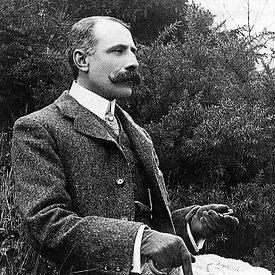By: Frank Cadenhead
Two concerts, Thursday and Friday, January 12 and 13, 2017, give a view to the future of the Paris music scene. The Thursday concert, with the first appearance of the new music director of the Orchestre National de France in his new role, gives a positive impression.
Emmanuel Krivine, 69, is not among the handful of world-famed conductors. His predecessor, Daniele Gatti, is moving on to lead the Concertgebouw Orchestra. His appointment as Gatti’s successor was a bit of a surprise to some given his lack of top status and his history of leaving behind unhappy orchestras, one of which was the sister radio orchestra, the Orchestre Philharmonique de Radio France, which he lead from 1976 to 1983. Although French (born of a Polish mother and Russian father), he does not often appear on the scene in France; his other job is principal guest conductor of the Scottish Chamber Orchestra. He seems to have found a rapport with his new colleagues and their playing was involved, focused and on a high level. One hopes that can continue.
The way he approaches the classics was indicated in the first piece, the Rachmaninoff Third Piano Concerto with the towering Russian pianist, Denis Matsuev, at the keyboard. The approach of most conductors is to race through the orchestral noodling to sail with the grand melodies. Krivine’s style is more analytical and you suddenly discover the noodling is actual complex music and reminds you that this concerto is indeed a 20th Century work (1909). The clarity of Krivine’s vision has you hearing this warhorse with new ears and this focus added important intensity to the concerto’s finale. Matsuev is breathtaking in his easy mastery of this fiendishly difficult concerto and his sense of style and elegance never lags. He is easily classed as one of today’s great interpreters of Rachmaninoff and any appearance near you should not be missed.
The second part of the concert, the Dvorak Seventh Symphony, also was a musical triumph. The orchestra was excellent form and the driven intensity brought cheers from those in the Radio France Auditorium. This concert can be seen on concert.arte.tv and is recommended.
Quite a difference experience Friday night in the Salle Pierre Boulez at the Philharmonie de Paris. The Chicago Symphony was on their first stop of a European tour with their music director Riccardo Muti. This is a great orchestra with masterful musicians and their maestro has them in brilliant form. The two works in the first half, Paul Hindemith’s Koncertmusik, Op.50, and Edward Elgar’s In the South (Alassio), also an Opus 50, were both unfamiliar to me but were found to be engaging, splendid music. We sometimes need to be reminded that composers have a lifetime of compositions worthy of attention and the dull focus on a few of the popular ones leaves most others on the shelf.
The second half had no such mission with Modest Mussorgsky’s two orchestral hits, Night on Bald Mountain (with the Rimsky-Korsakov transcription) and Pictures at an Exhibition (in Ravel’s orchestration). This allows many in the audience to compare (unfavorably) the recording they have at home with the spectacular brilliance of the Chicago Symphony’s reading under Muti. Cheering and long applause ended the evening and the extra money you paid for the tickets was certainly, by the last note, forgotten. As an encore, the rambunctious overture to Verdi’s The Sicilian Vespers was enthusiastically welcomed. You can see that its ranking among the top world orchestras is no exaggeration. It is virtuosic and profound at the same time with a consistency reminding you of the Berlin or Vienna Philharmonics.
The new Philharmonie, which opened only on the 14th of January of 2015, was the first stop of the Chicago forces but the next two nights are the Elbphilharmonie in Hamburg which had its opening night only last Wednesday. Muti and Chicago have, of course, no previous experience with the new Parisian hall which has received much praise. Acoustically alive, the hall sounded a bit overwhelmed by Muti’s forceful music making. I kept wanting a but less volume.
The Paris hall, on its opening, was the subject of much criticism. The original cost had ballooned three-fold and the delay was years. The Berlin hall, however, has been the mother of all cost-overruns and delays and, thankfully, that story has been occupying space in the press for some time while the diatribes about Paris’ Philharmonie are only a memory. While the architects were different, the “vineyard” layout and closeness of the audience to the podium are similar. Another similarity was the acoustical consultants, Nagata Acoustics and their renowned acoustician, Yasuhisa Toyota.
Reading the early critical reaction an item sticks out. While the sound is very “present” critics have noted that individual instruments can be heard clearly even in tutti passages and thus the full orchestra sound seems fragmented. The same thing was noted by me and others in Paris and the Philharmonie management decided, after the January opening, to close the hall in July and August and tinker with the acoustics some more. With the new season that followed, an orchestra full-bore sounded like an orchestra full-bore and the sigh was audible. Visiting orchestra and soloists are full of praise and love the visceral impact of the Philharmonie’s musical experience. The reputation of the hall is at the top of world rankings and it may be that Hamburg might need a short pause to put into effect the acoustical polish of Paris.
This is a high-profile event in the life of Hamburg, who has always competed with Munich as to who is the “second city” in Germany. Hamburg has always come up short in the classical music arena but the new hall will certainly go a long way to revitalize Hamburg’s musical life. The Paris Philharmonie has certainly done so for Paris.

